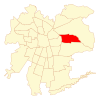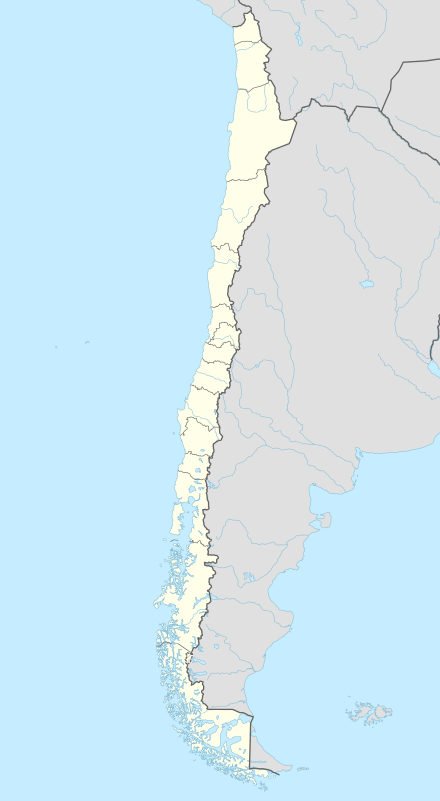La Reina
| La Reina | ||||||
|---|---|---|---|---|---|---|
| City and Commune | ||||||
|
In the background, Cerro Provincia (left) and the Cerro San Ramón (centre) | ||||||
| ||||||
| Coordinates: 33°27′S 70°33′W / 33.450°S 70.550°WCoordinates: 33°27′S 70°33′W / 33.450°S 70.550°W | ||||||
| Country | Chile | |||||
| Region | Santiago Metro. | |||||
| Province | Santiago | |||||
| Government[1][2] | ||||||
| • Type | Municipality | |||||
| • Alcalde | Raúl Donckaster Fernández (PDC) | |||||
| Area[3] | ||||||
| • Total | 23.4 km2 (9.0 sq mi) | |||||
| Population (2002 Census)[3] | ||||||
| • Total | 96,762 | |||||
| • Density | 4,100/km2 (11,000/sq mi) | |||||
| • Urban | 96,762 | |||||
| • Rural | 0 | |||||
| Sex[3] | ||||||
| • Men | 44,293 | |||||
| • Women | 52,469 | |||||
| Time zone | CLT[4] (UTC-4) | |||||
| Area code(s) | 56 + | |||||
| Website | Municipality of La Reina | |||||
La Reina (Spanish: "The Queen") is a commune of Chile located in Santiago Province, Santiago Metropolitan Region. It was originally the Larraín family ranch; the corruption of the Larraín surname gives the area its unusual name. It was created in 1963 from an eastern portion of the Ñuñoa commune.
La Reina is a leafy, residential commune, inhabited by mostly mid to upper-mid income families, with certain areas inhabited by mid-low (Villa La Reina) and high-income (La Reina Alta, towards the east) groups. It consistently ranks in the top five communes with the best quality of life in the Metropolitan Region. A small airport —Aerodrómo Eulogio Sánchez Errázuriz (better known as Tobalaba)— is located on the southern part. The military recently opened its new hospital complex along the commune's main avenue Avenida Larraín.
Demographics
According to the 2002 census of the National Statistics Institute, La Reina spans an area of 23.4 km2 (9 sq mi) and has 96,762 inhabitants (44,293 men and 52,469 women), making the commune an entirely urban area. The population grew by 4.7% (4,352 persons) between the 1992 and 2002 censuses.[3] The 2006 projected population was 96,551.[5]
Indicators
- Average annual household income: US$42,248 (PPP, 2006)[5]
- Population below poverty line: 7.8% (2006)[6]
- Regional quality of life index: 86.23, high, 4 out of 52 (2005)
- Human Development Index: 0.883, 5 out of 341 (2003)[7]
Notable residents
- Michelle Bachelet, current President of Chile
- Fernando Castillo Velasco, architect, former mayor of La Reina and former governor of the Santiago Metropolitan Region
- Amanda de Negri Quintana, lawyer and former political prisoner under Pinochet's regime
- Mónica Echeverría Yáñez, writer
- Fernando González, retired tennis player
- Erich Honecker, former president of East Germany
- Margot Honecker, former Education Minister of East Germany, wife of Erich Honecker
- Ricardo Lagos, former President of Chile
- Nicanor Parra, poet
Administration
As a commune, La Reina is a third-level administrative division of Chile administered by a municipal council, headed by an alcalde who is directly elected every four years. The 2012-2016 mayor is Raúl Donckaster Fernández (PDC). The communal council has the following members:
- José Manuel Palacios Parra (UDI)
- Sara Campos Sallato (PDC)
- María Olivia Gazmuri Schleyer (RN)
- Pedro Davis Urzúa (IND)
- Pamela Gallegos Mengoni (UDI)
- Adriana Muñoz Barrientos (PPD)
- Bernardita Rivera Paredes (PDC)
- Emilio Edwards Gandarillas (UDI)
La Reina is represented in the Chamber of Deputies by Jaime Pilowsky (PDC) and José Antonio Kast (UDI) as part of the 24th electoral district (together with Peñalolén). The commune is represented in the Senate by Carlos Montes (PS) and Manuel José Ossandón (RN) as part of the 8th senatorial constituency (Santiago-East).
See also
- The Grange School, Santiago - school located in the district
- Andree English School, Santiago.
- Colegio Las Américas, Santiago.
- Colegio Madrigal, Santiago.
References
- ↑ "Asociación Chilena de Municipalidades" (in Spanish). Retrieved 27 January 2011.
- ↑ "Municipality of La Reina" (in Spanish). Retrieved 27 January 2011.
- 1 2 3 4 "National Statistics Institute" (in Spanish). Retrieved 13 December 2010.
- ↑ "Chile Time". WorldTimeZones.org. Retrieved 26 September 2010.
- 1 2 "System of Regional Information". Ministry of Planning of Chile (in Spanish). Retrieved 13 September 2010.
- ↑ "Poverty in the Santiago Metropolitan Region" (PDF). Ministry of Planning of Chile (in Spanish). Archived from the original (PDF) on August 24, 2007.
- ↑ "The Trajectories of Human Development in the Communes of Chile (1994-2003)" (PDF). Government of Chile, Mideplán (in Spanish). UNDP. Retrieved 13 September 2010.
External links
- (Spanish) Municipality homepage





